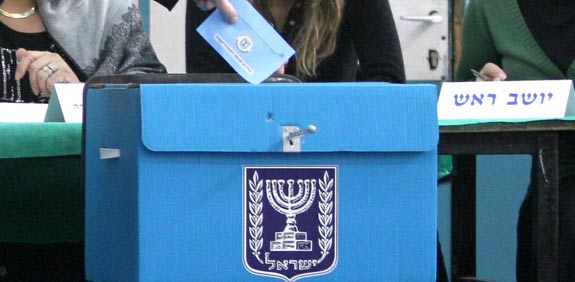Israeli Chronicles — Connecting Israel & Cincinnati

Everything is political
Everything is political.
Here we are on November 18, and America has voted. There are differing opinions about the outcome, but one thing is for sure. Being here to witness America’s democracy in action has been truly fascinating.
A year and a half ago we had elections in Israel. Our democratic system is totally different from the American one. We had 22 parties to choose from. We vote for a party and not a candidate. The parties have to form a coalition that will create a majority of at least 61 parliament members (Knesset members) so they can govern, and the government needs to be approved by the parliament.
Did I mentioned different? 🙂
The 2015 election in Israel caught me by surprise. I was not planning on spending almost two months out of my first year of shlichut (being an emissary) in America, talking about elections and the democratic system in Israel in almost every synagogue and Jewish institution around town, because 2015 was not supposed to be an election year in Israel.
But—what happens in Israel is that almost every election is pushed earlier because of the parliament disapproving of the government, or a collapse of coalition, forcing us to practice our democratic rights to vote, on average, every 2.8 years, instead of every four.
Elections are a big deal in Israel. Politics is a big deal in Israel. Unlike in America, people love to talk politics—anywhere anytime. People don’t try to avoid political conversations—to the contrary—they try to provoke these conversations.
For us, voting is a big deal. If you are an Israeli citizen, you can only vote if you are physically in the state of Israel. There are citizens who fly in in order to vote. In 2015, we were lucky, and since I held (and still hold) an official position of the state of Israel, as a shlicha (emissary), my husband and I could vote here in the US. We got in the car, schlepping the kids, on a freezing March morning, and drove all the way to the Israeli consulate in Chicago to vote. It’s just what you do.
Everything is political! And in Israel—for sure.
Election Day is a big deal in Israel. Maybe it’s because we are so outspoken. Maybe it’s because we are a young country of only eight million people so you feel your vote can really make a difference. Maybe it’s the Jewish habit and culture of disagreeing. Whatever it is—Israel gets excited on Election Day.
It is a day off for everyone, allowing all people to vote. There is a sense of celebration in the air— teens on the streets with banners, drivers honking in intersections to support one banner or another.
Looking back on America’s election season, I can confidently say being here during this time has been a fascinating experience: understanding the unwritten rules of when you can and when you shouldn’t talk politics, getting to know the American political and democratic system, seeing the debates, reading the reports, hearing what people in the community have to say.
Whoever you supported on Election Day, I think it can be agreed that it will be a day that America will remember. It made me think of a poem written by a wonderful poet I love, so since I could not vote, I thought I could at least share this with you:
Children of an Epoch
By Wislawa Szymborska
We are the children of an epoch,
the epoch is political.
Everything of yours, ours, theirs,
daytime affairs, night-time affairs,
are political affairs.
Like it or not,
your genes have a political past,
your skin has a political hue,
and your eyes a political aspect.
What you speak about has resonance,
What you hush has a voice
more or less political.
Even walking through field or forest
you take political steps
on a political basis.
Apolitical verses are also political,
and the moon above is shininga thing no longer moonly.
To be or not to be, that is the question.
What kind of question? answer, my dear.
A political question.
You don’t even have to be a human being
to profit from political significance.
It’s suffices for you to be crude oil,
animal feed or recycled materials.
Or a conference table, about whose shape
they debated for months
as though it were a matter of life or death:
should it be round or square?
Meanwhile people perished,
animals died,
homes burned
and fields went to seed
as they did in less political
bygone epochs.
Translated by Walter Whipple

